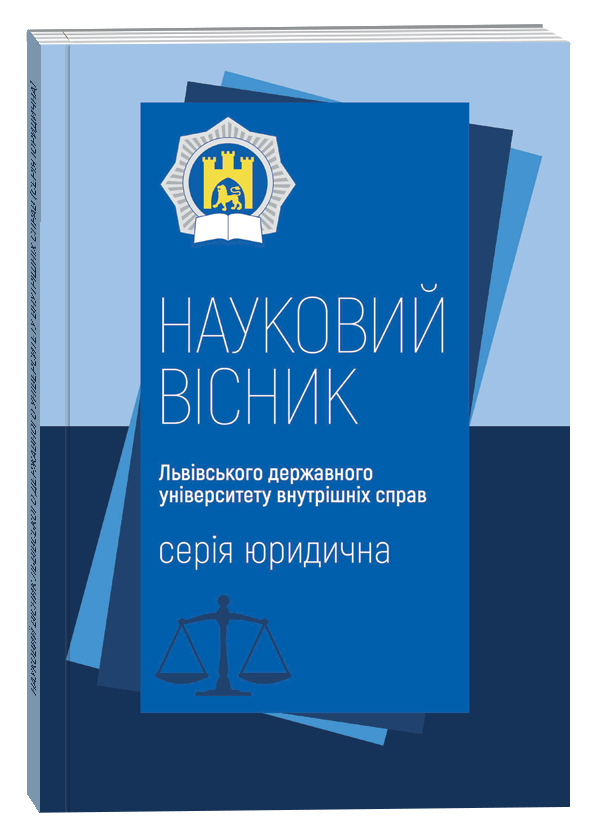THE ELECTRONIC EXPERT REPORT AS EVIDENCE IN UKRAINIAN CRIMINAL PROCEEDINGS: LEGAL PRACTICE, CHALLENGES, AND PROSPECTS
DOI:
https://doi.org/10.32782/2311-8040/2025-2-12Keywords:
criminal procedure, electronic expert opinion, electronic document, qualified electronic signature, admissibility, digitalisation, evidence, information technology, interdisciplinary approachAbstract
This article is devoted to the analysis of the role of expert opinions within the Ukrainian criminal procedure system, specifically when such opinions are presented in the form of electronic documents. The paper emphasises that existing legislative provisions – particularly those enshrined in the Law of Ukraine “On Electronic Documents and Electronic Document Flow” – allow expert opinions in electronic form to be used as legitimate sources of evidence. At the same time, current procedural practices related to the creation, verification, and examination of such documents remain fragmented and inconsistent, thereby jeopardising the admissibility of such evidence in criminal proceedings. The study offers a systematic interpretation of the provisions of the Criminal Procedure Code of Ukraine, as well as special legislation and subordinate regulations governing the creation, signing, transmission, storage, and examination of expert opinions in electronic form. A comprehensive analysis of the legal and practical risks is provided, including those associated with the potential loss of authenticity, misinterpretation of the legal status of a document’s visual representation, and non-compliance with the requirements for qualified electronic signatures (QES). The article advances several key conclusions. First, it is necessary to append both a hard copy and the electronic file of the expert opinion, along with the QES verification file, to the case materials. Second, it is advisable to verify the integrity of the electronic file and the authenticity of the QES at every stage of the criminal process. Third, such opinions must be signed exclusively with a qualified electronic signature. Fourth, courts must examine the actual electronic version of the expert opinion, verifying both the file’s integrity and the validity of the QES. In addition, the study confirms the permissibility of storing all electronic documents (as defined in Article 5(1) of the Law of Ukraine “On Electronic Documents and Electronic Document Flow”) related to a single criminal proceeding on a unified data carrier to optimise resource use. The author proposes an algorithm for managing expert opinions in electronic form at all stages of criminal proceedings – from initial receipt and verification to courtroom examination – ensuring compliance with the principle of immediacy and evidentiary admissibility standards. It is argued that the effective use of such evidence requires regulatory precision, methodological standardisation, and procedural formalisation of actions by authorised actors. The findings of this research form a basis for updating legal practice and for the future codification of rules governing electronic forms of evidence in Ukrainian criminal proceedings.
References
Про електронні документи та електронний документообіг : Закон України від 22 травня 2003 року № 851-IV (зі змін. і доп.). URL: https://zakon.rada.gov.ua/laws/show/851-15#Text (дата звернення: 10.04.2025).
Столітній А.В. Електронний висновок експерта в кримінальному провадженні. Криміналістика і судова експертиза. 2019. Вип. 64. С. 102–111. DOI: https://doi.org/10.33994/kndise.2019.64.07. URL: http://nbuv.gov.ua/UJRN/krise_2019_64_11.
Вілінський М. Електронний висновок експерта: теоретичні основи та практичний аспект. Вісник Київського національного університету імені Тараса Шевченка. Юридичні науки. 2023, № 2(126). DOI: https://doi.org/10.17721/1728-2195/2023/2.126-2. URL: https://legal.bulletin.knu.ua/article/view/1116/2164.
Кримінальний процесуальний кодекс України : Закон України від 13 квітня 2012 року № 4651-VI (зі змін. і доп.). URL: https://zakon.rada.gov.ua/laws/show/4651-17#Text (дата звернення: 10.04.2025).
Про внесення змін до деяких нормативно-правових актів з питань судово-експертної діяльності : Наказ Міністерства юстиції України від 21 червня 2022 року № 2578/5. URL: https://zakon.rada.gov.ua/laws/show/z0687-22#Text (дата звернення: 01.05.2025).
Інструкція про призначення та проведення судових експертиз та експертних досліджень : Наказ Міністерства юстиції України від 08 жовтня 1998 року № 53/5 (зі змін. і доп.). URL: https://zakon.rada.gov.ua/laws/show/z0705-98#n14 (дата звернення: 01.05.2025).
Про електронну ідентифікацію та електронні довірчі послуги : Закон України від 5 жовтня 2017 року № 2155-VIII (зі змін. і доп.). URL: https://zakon.rada.gov.ua/laws/show/2155-19#Text (дата звернення: 10.04.2025).
Постанова Верховного Суду від 10 квітня 2024 року у справі № 320/2919/20 (№ 937/2929/20). Єдиний державний реєстр судових рішень. URL: https://reyestr.court.gov.ua/Review/118356542 (дата звернення: 19.04.2025).









